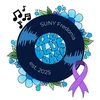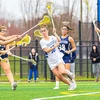
This summer English as a Second Language (ESL) graduate students (from left) Courtney
Hanzlian, Caitlin Gunner, and Meghan Troutman took time to tour some ancient Mexican ruins in Cuetzalan, about three hours outside of their host city of Puebla, where they taught for five weeks.
Fredonia teacher candidates have more options than ever to “internationalize” their experience through teaching and service-learning options on three continents. These partnerships enable students to seize unique opportunities to become more effective teachers while immersing themselves in a new culture.
Four international initiatives place dozens of undergraduate and graduate students in field experiences, student teaching settings and service learning projects. “For our undergraduates, we have a variety of options, from two weeks in Belize to nine weeks in Australia,” said Christine Givner, founding dean of the College of Education.
All four initiatives rely on university partnerships in host countries whose educational door swings both ways, as foreign students are hosted by SUNY Fredonia and learn in Western New York schools. There are also faculty exchanges between Fredonia and its foreign partners.
The Belize service learning project, held during the January “J-Term” for the last seven years and directed by Dr. Janeil Rey, often attracts the most students who volunteer in schools in Belize City, the Central American country’s largest city. This past semester, 28 students and four professors were assigned to two primary schools, a secondary school and a special education school.
Puebla, Mexico, is the host city for student teaching assignments, lasting 20 or 40 days, for graduate students in Fredonia’s newest international initiative, TESOL (Teaching English to Speakers of Other Languages). Kate Mahoney, TESOL programs coordinator, directs the Mexico program.
Field experiences with the University of Plymouth, England, a program directed by Drs. Cynthia Smith, Kathleen Magiera and Mira Berkley, enable graduate students and others to advance their skills and learn about the British educational system over a three-week period in June. This year the 24-year-old program placed 10 Fredonians in British elementary schools, and hosted nine English students here.
Stacey Fletcher, one of those students from England, observed how art and music are taught by specially trained teachers brought into her third-grade classroom at Fredonia Elementary School. In her homeland, all subjects are taught by one teacher.
The Australian student teaching experience in Queensland is the longest, from January through mid-March. It begins with a four-week education curriculum at the University of Sunshine Coast, followed by five weeks of student teaching in public schools. Students then return to Fredonia for a second student teaching placement for the balance of the spring term.
“I had 12 students go down this last time, and all were very positive about the experience,” said Dr. Clara Beier, who served with fellow program directors Drs. Karen Lillie and Karen Lindeman before retiring in June. “One student mentioned that the experience helped her step out of her comfort zone, by going halfway around the world, meeting new people and living in a different country,” she explained. “It gives them a much broader experience than teaching solely in Western New York.”
There’s probably no greater enthusiast of international experiences than Early Childhood Education major Julie Ticco, ’13. “Traveling abroad helps to define who you are,” said the recent graduate, who visited Belize and Australia in back-to-back years. “Throughout my two abroad experiences, I found qualities and strengths in myself that I didn’t know existed! The experiences you have abroad are unique and special; nothing else can compare to those moments.” Ticco will begin her TESOL master’s program at Fredonia this fall.
Faculty exchanges have also provided valuable insights into issues and concerns that educators face in other countries.
“We share what we’re doing and they share what they’re doing, from national policy to state regulations to curriculum. We look at their syllabi and how they define inclusion, what diversity looks like there, and what challenges they face,” Dean Givner explained.
Ambitious is an adjective Givner assigns to Fredonians who embark on these experiences.
“They tend to be students who want to expand their horizons,” she said. “We get students who have not been any further away than Syracuse in their whole lives who are really looking to broaden their horizons; on the other hand, we get students who have traveled around the world already but are interested in expanding their experiences. The program provides students with experiences that demonstrate that they are well versed and have had experience with an education system outside of the U.S. I think it is an asset on their vitae,” she added.
The College of Education wants to ensure that every degree candidate is able to have an international experience of one kind or another, said Givner, who hopes to expand the program into other countries, including China, and is pursuing a possible joint program in India with other SUNY campuses.
“We want to internationalize the field experience, and our curriculum, so our teachers understand that they’re global citizens,” she added.



